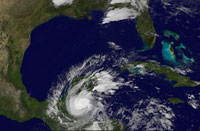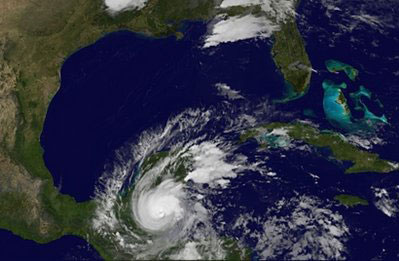Hurricane Richard slammed into  as authorities evacuated tourists from outlying islands and an estimated 10,000 people took refuge at shelters in the tiny Central American nation.
as authorities evacuated tourists from outlying islands and an estimated 10,000 people took refuge at shelters in the tiny Central American nation.
The U.S. National Hurricane Center in Miami said Richard's top winds were 90 mph (150 kph) — making it a Category 1 hurricane — when it made landfall about 20 miles (35 kms) south-southwest of Belize City, whose neighborhoods are full of wooden, tin-roof homes that are very vulnerable to winds.
Hurricane Richard slammed into
The U.S. National Hurricane Center in Miami said Richard's top winds were 90 mph (150 kph) — making it a Category 1 hurricane — when it made landfall about 20 miles (35 kms) south-southwest of Belize City, whose neighborhoods are full of wooden, tin-roof homes that are very vulnerable to winds.
"The winds are very strong ... it's getting stronger," said Fanny Llanos, a clerk at the Lazy Iguana bed and Breakfa st on Caye Caulker, a low-lying island known for its coral reefs and crystal-clear waters, located just offshore from Belize City.
st on Caye Caulker, a low-lying island known for its coral reefs and crystal-clear waters, located just offshore from Belize City.
Llanos said that palm trees were bending over in the wind and it had become very noisy.
"All the windows are boarded, and this is a strong house so we will be here," she said, "but we are still afraid."
There were no immediate reports of injuries or deaths in
The hurricane center said Richard was moving west-northwest over central
Official estimated that about 10,000 people had taken refuge at storm shelters in schools and churches located farther inland, including many in the capital,
Tourists had already been evacuated from Caye Caulker and nearby Ambergris Caye, but some local residents decided to ride out the storm.
Rafael Marin, the caretaker at the Anchorage Resort hotel, said strong gusts of wind were already hitting the island and its normally calm waters were being whipped into 3-foot (1-meter) waves lapping at the island's docks.
"We already boarded up everything, and we already got everything — office equipment and everything — stored in a safe place," Marin said. "We got all the tourists out, and get the whole place secured down."
But Marin planned to ride out the storm in the three-story hotel. He said he expected only some beach erosion and minor damage to homes, noting the island has been hit by more powerful storms in the past.
"The local people are advised to evacuate on their own, voluntarily," Marin said. "It's not really major, like a Category 3" hurricane.
Officials warned people living in flimsy homes or low-lying areas to evacuate, and shelters at schools and other public buildings began filling up.
Earlier, Richard dumped heavy rains on
Observers reported winds of up to 58 mph (93 kph) on Roatan, and more than 90 people took refuge in shelters in the
Lisandro Rosales, the head of
But Richard's heavy rains did cause a landslide that blocked a highway in northern
Richard is expected to cross over the Yucatan peninsula and re-emerge in the
Authorities said dangerous floods and mudslides were still possible in

 Previous page
Previous page Back to top
Back to top







